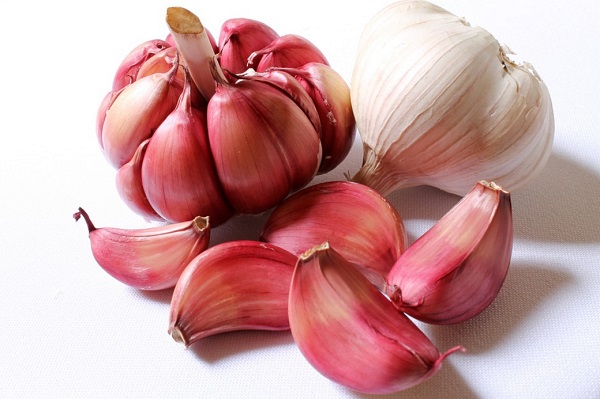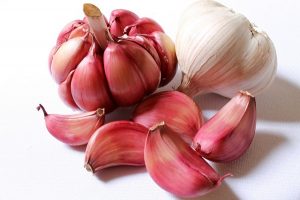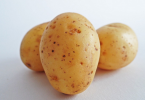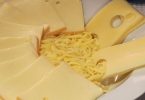Whether warding off mosquitoes or vampires, dressing up as a comedy French man or just adding a little flair to, well lets face it everything tastes better with garlic, this close relative of the onion is everywhere. But can cats eat garlic?
It has been with us for over 7,000 years and has made its way from the central Asian plains through the Mediterranean and is now found and indeed grown across the globe.
You will find it in most kitchens and in a huge variety of sauces and premade meals so if you are planning on giving your buddy a little meaty treat off your own plate you should know the effect that garlic can have on cats.
Can cats eat garlic?
No, cats should not eat garlic. Garlic like onions, chives, and leeks are all part of the Allium family and are toxic to cats. Garlic is the worst offender being up to five times as poisonous as onions. Many pet owners are already weary of garlic and onion effects on pets, but cat owners should be that much more careful to keep their cats away from garlic and garlic seasoned food.
Effects of garlic on cats
The problem garlic has on cats arises with the organosulfur compounds found in the garlic, which causes oxidative hemolysis. This happens when antioxidant pathways cannot cope with the level of oxidants in the blood; cats are up to three times more susceptible to this than other pets. Cats have smaller bodies than most other meat eating animals, and have more complicated digestive systems. Cats simply cannot digest the compounds within garlic.
Hemolytic anemia, which is the bursting of red blood cells, can lead to gastroenteritis, which in turn can lead to an inflammation of the stomach and intestines. Understandably this can cause your cat considerable discomfort and be a precursor to more serious ailments.
The symptoms of garlic poisoning may not be evident immediately and they can actually take a number of days to appear, so even if there seems to be no signs of problems after you a have detected that your cat has ingested some, it is very important to keep a close eye on him. If your cat has been fed garlic by an unsuspecting patron, or has eaten food that contains garlic, be sure to watch for any signs of distress of pain. Calling your vet in advance and making notes of symptoms to be mindful of just may save the life of your cat should s/he become poisoned.
Symptoms of garlic poisoning in your furry friend may include vomiting, diarrhea, breathlessness, weakness, increased heart rate, lethargy, pale gums and worryingly, collapse. Your cat may also show a lack of appetite or even refusal of all food. The smell of garlic is a dead giveaway if ever there was one.
Vomiting and diarrhea are good for your cat to experience because the body is forcefully removing the toxins from the body of your cat. This is good for your cat in some ways, but bad in others. Be sure to keep your cat hydrated during this process. In the event your cat is weak and breathless, be sure to rush to the vet as soon as possible as your cat is beginning to have respiratory distress.
How much is too much?
Garlic is more concentrated than the onion. Onions are known for their toxicity which has a toxicity of two grams per pound of body weight, and only 0.05% body weight in total if eaten in one sitting. Garlic has a toxicity level of around five times that of onion, leading us to see that even small amounts of garlic can be very dangerous to cats. As little as one clove eaten should be cause for concern.
It should be noted that in addition to fresh or cooked garlic, consuming juices, powdered cooking preparations, food preparations derived from any Allium species has the potential to be harmful to cats. Keeping foods cooked with garlic out of the reach of cats is incredibly important.
Also to keep in mind is trash thrown away and left behind in a trash can. Cats that are curious may get into a trash can and eat food, or lick napkins that have traces of garlic. If your cat likes to drink from cups of lick the sides of glasses in the sink, be sure to wash and put away any cups that we used to drink smoothies containing garlic. Leaving traces of garlic around the kitchen, or in an area your cat frequents, is just as dangerous as outright giving your cat the garlic.
Treatment
Diagnosis of garlic poisoning is typically through clinical signs, health history and confirmation of Heinz body-type hemolytic anemia. Heinz bodies are small round inclusions within the red cell body, formed by damage to the hemoglobin component molecules through oxidant damage. They can reduce the red blood cell survival time, leave red blood cells open to damage and have other undesirable effects in cats which can leave your pet vulnerable to circulatory problems.
Unfortunately there is no specific antidote for Allium toxicosis. Treatment will usually involve the removal of the offending substance from your cat, mainly through dietary changes and treatment of the anemia and then general supportive care. The administration of activated charcoal and blood transfusions would be a last resort
Prevention of garlic toxicity
Garlic is seemingly everywhere so it may be difficult to ensure your cat will never come into contact with it in any of its forms but sensible precautions can be taken. Keep your garlic in a sealed container (it will stay fresh this way), and be careful when disposing of the skins. It is worth noting that cumulative damage can occur with repeated ingestion. IF your cat ingests garlic one time and survives, take your luck and be sure to never have garlic around your cat again. Just because your cart survived one time, does not mean s/he will survive again.
Some pet foods actually contain garlic and you may see it on the list of ingredient but as they are listed in order of decreasing volume as long as it is near the bottom there is no need for great concern. Any garlic listed upon the ingredient label would have been added for a purpose and added in a quantity or amount that will not cause any harm to your pet.
What may be slightly more of a worry are sites that actively promote giving garlic to your cat as a health supplement. Garlic is a wonderful supplement and has high nutritional values-but not for cats, only for people. Foods that benefit humans should not always be fed to cats. These websites are against giving any drugs for any reason and without getting into the debate about homeopathic remedies and the like; it is worth stating that no health benefit has ever been attributed to garlic as a pet food in any peer reviewed scientific study.
Conclusion
Knowledge is power when it comes to the question ‘Can cats eat garlic?’ The knowledge that garlic is not only potentially life threatening, but also the awareness of which products around your house may contain garlic in a level that may harm your cat, should give you as a cat owner the inclination to avoid this spice. Even though your cat cannot have the spice does not mean you cannot enjoy it. So do not throw the garlic out and enjoy the joys of “the stinking rose”- just be sure to keep it all for yourself.
References:
http://www.aspca.org/pet-care/animal-poison-control/people-foods-avoid-feeding-your-pets
http://www.petmd.com/cat/conditions/cardiovascular/c_ct_anemia_heinz_body
https://en.wikipedia.org/wiki/Heinz_body
http://www.petmd.com/cat/emergency/poisoning-toxicity/e_ct_human_food_poisoning









Leave a Comment